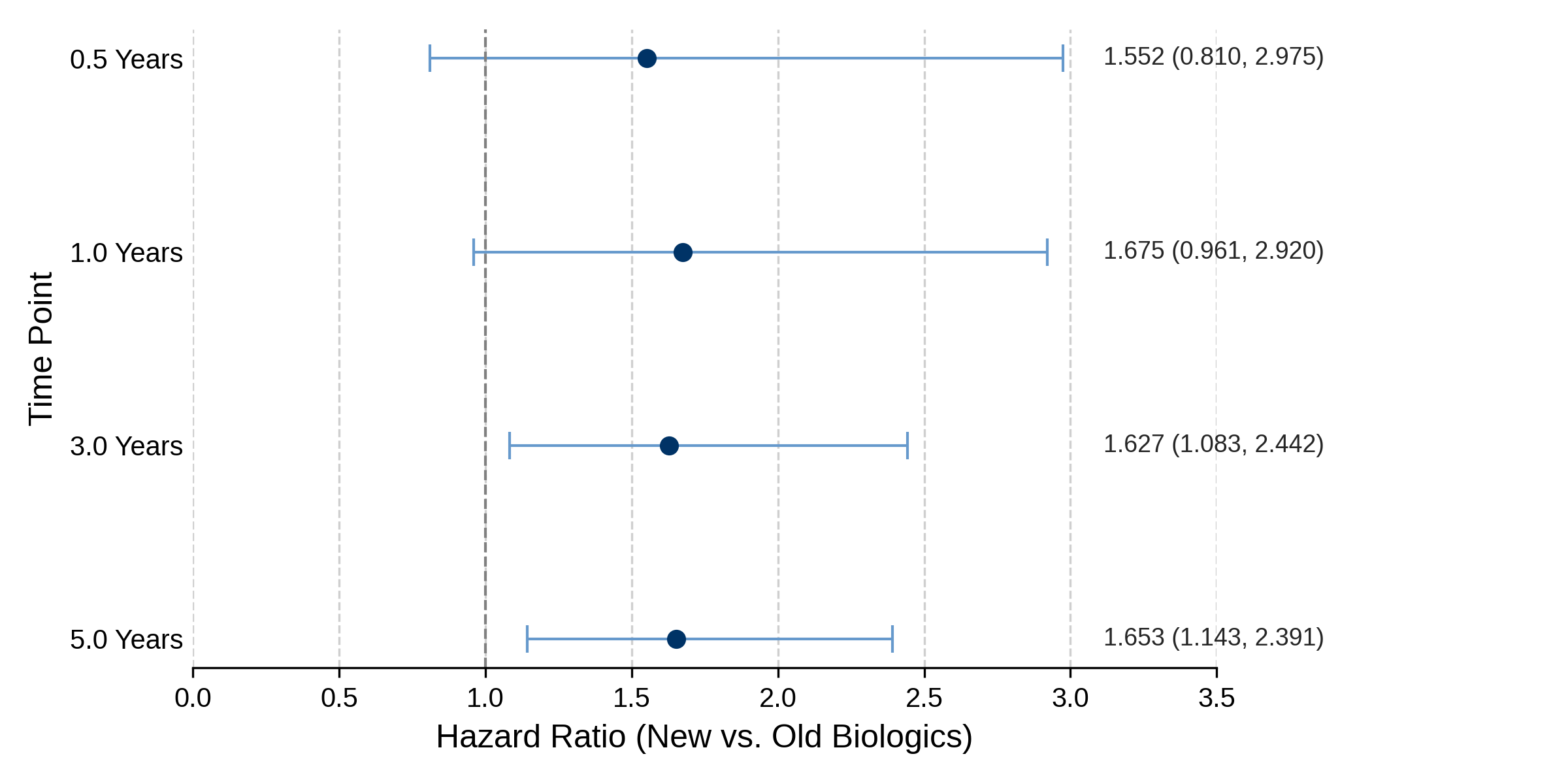Monday Poster Session
Category: IBD
P3299 - Newer Biologics Show Lower Long-Term Cancer Risk Compared to TNF Inhibitors in Inflammatory Bowel Disease: A 5-Year Real-World Analysis
Monday, October 27, 2025
10:30 AM - 4:00 PM PDT
Location: Exhibit Hall

Omar Arman, MD, MPH
University at Buffalo
Depew, NY
Presenting Author(s)
Omar Arman, MD, MPH1, Ahmad Younis, MD2, Sharifeh Almasaid, MD, MPH3, Ahmed Abdulelah, MD4, Omar Daas, MD5, Noor Arman, MD5, Hebah Jaber, MD6, Khaled Rafeh, MD7, Mazen Zamzam, BS8, Jad Bou-Abdallah, MD1
1University at Buffalo, Buffalo, NY; 2Cleveland Clinic, Cleveland, OH; 3SUNY Upstate Medical University, Syracuse, NY; 4University of Cambridge, Cambridge, England, United Kingdom; 5University of Jordan School of Medicine, Amman, 'Amman, Jordan; 6Mutah University, Mutah, Al Karak, Jordan; 7School of Medicine, The University of Jordan, Shmeisani, 'Amman, Jordan; 8Oakland University William Beaumont School of Medicine, Royal Oak, MI
Introduction: Inflammatory bowel disease (IBD) is associated with chronic inflammation, increasing cancer risk through mechanisms such as DNA damage and cell proliferation. Biologic therapies, including tumor necrosis factor (TNF) inhibitors and newer biologics targeting alternative inflammatory pathways, play a pivotal role in IBD management. However, their long-term cancer risk remains a critical concern. This study evaluates the comparative cancer risk of TNF inhibitors versus newer biologics over 1, 3, and 5 years using real-world data.
Methods: We analyzed cancer incidence in IBD patients (aged ≥18) treated with TNF inhibitors or newer biologics between January 2015 and December 2020 using the TriNetX database. Propensity score matching balanced demographic and clinical characteristics, creating two comparable cohorts (n = 20,354 each). We used Kaplan-Meier analysis and log-rank tests to calculate cancer-free probabilities and assess relative cancer risks through hazard ratios (HRs) and risk differences.
Results: Newer biologics consistently demonstrated lower cancer risks compared to TNF inhibitors across all time points. At 1 year, cancer risk differences were similar (p = 0.074), but significant reductions emerged by 3 years (p = 0.026) and 5 years (p = 0.013). The 5-year cancer-free probability was higher for newer biologics (99.54%) compared to TNF inhibitors (99.20%, p = 0.007). Hazard ratios confirmed a persistent safety advantage for newer biologics, with a 5-year HR of 1.653 (95% CI: 1.143–2.391).
Discussion: Our study demonstrates that newer biologics provide a favorable long-term safety profile, with progressively lower cancer risks compared to TNF inhibitors. These findings highlight the importance of incorporating safety considerations into IBD treatment decisions, particularly for patients with heightened cancer risk. Future research should investigate the biological mechanisms underlying these differences and assess the broader clinical implications to optimize treatment strategies.

Figure: Table 1: Kaplan-Meier analysis of cancer-free probabilities for IBD patients treated with newer biologics versus TNF inhibitors at 1, 3, and 5 years, showing progressively higher survival probabilities in the newer biologics cohort.

Figure: Figure 1: Forest plot displaying the hazard ratios (HR) and 95% confidence intervals (CI) for cancer risk in IBD patients treated with new versus old biologics at different time points over a 5-year period, demonstrating a persistent safety advantage for newer biologics.
Disclosures:
Omar Arman indicated no relevant financial relationships.
Ahmad Younis indicated no relevant financial relationships.
Sharifeh Almasaid indicated no relevant financial relationships.
Ahmed Abdulelah indicated no relevant financial relationships.
Omar Daas indicated no relevant financial relationships.
Noor Arman indicated no relevant financial relationships.
Hebah Jaber indicated no relevant financial relationships.
Khaled Rafeh indicated no relevant financial relationships.
Mazen Zamzam indicated no relevant financial relationships.
Jad Bou-Abdallah indicated no relevant financial relationships.
Omar Arman, MD, MPH1, Ahmad Younis, MD2, Sharifeh Almasaid, MD, MPH3, Ahmed Abdulelah, MD4, Omar Daas, MD5, Noor Arman, MD5, Hebah Jaber, MD6, Khaled Rafeh, MD7, Mazen Zamzam, BS8, Jad Bou-Abdallah, MD1. P3299 - Newer Biologics Show Lower Long-Term Cancer Risk Compared to TNF Inhibitors in Inflammatory Bowel Disease: A 5-Year Real-World Analysis, ACG 2025 Annual Scientific Meeting Abstracts. Phoenix, AZ: American College of Gastroenterology.
1University at Buffalo, Buffalo, NY; 2Cleveland Clinic, Cleveland, OH; 3SUNY Upstate Medical University, Syracuse, NY; 4University of Cambridge, Cambridge, England, United Kingdom; 5University of Jordan School of Medicine, Amman, 'Amman, Jordan; 6Mutah University, Mutah, Al Karak, Jordan; 7School of Medicine, The University of Jordan, Shmeisani, 'Amman, Jordan; 8Oakland University William Beaumont School of Medicine, Royal Oak, MI
Introduction: Inflammatory bowel disease (IBD) is associated with chronic inflammation, increasing cancer risk through mechanisms such as DNA damage and cell proliferation. Biologic therapies, including tumor necrosis factor (TNF) inhibitors and newer biologics targeting alternative inflammatory pathways, play a pivotal role in IBD management. However, their long-term cancer risk remains a critical concern. This study evaluates the comparative cancer risk of TNF inhibitors versus newer biologics over 1, 3, and 5 years using real-world data.
Methods: We analyzed cancer incidence in IBD patients (aged ≥18) treated with TNF inhibitors or newer biologics between January 2015 and December 2020 using the TriNetX database. Propensity score matching balanced demographic and clinical characteristics, creating two comparable cohorts (n = 20,354 each). We used Kaplan-Meier analysis and log-rank tests to calculate cancer-free probabilities and assess relative cancer risks through hazard ratios (HRs) and risk differences.
Results: Newer biologics consistently demonstrated lower cancer risks compared to TNF inhibitors across all time points. At 1 year, cancer risk differences were similar (p = 0.074), but significant reductions emerged by 3 years (p = 0.026) and 5 years (p = 0.013). The 5-year cancer-free probability was higher for newer biologics (99.54%) compared to TNF inhibitors (99.20%, p = 0.007). Hazard ratios confirmed a persistent safety advantage for newer biologics, with a 5-year HR of 1.653 (95% CI: 1.143–2.391).
Discussion: Our study demonstrates that newer biologics provide a favorable long-term safety profile, with progressively lower cancer risks compared to TNF inhibitors. These findings highlight the importance of incorporating safety considerations into IBD treatment decisions, particularly for patients with heightened cancer risk. Future research should investigate the biological mechanisms underlying these differences and assess the broader clinical implications to optimize treatment strategies.

Figure: Table 1: Kaplan-Meier analysis of cancer-free probabilities for IBD patients treated with newer biologics versus TNF inhibitors at 1, 3, and 5 years, showing progressively higher survival probabilities in the newer biologics cohort.

Figure: Figure 1: Forest plot displaying the hazard ratios (HR) and 95% confidence intervals (CI) for cancer risk in IBD patients treated with new versus old biologics at different time points over a 5-year period, demonstrating a persistent safety advantage for newer biologics.
Disclosures:
Omar Arman indicated no relevant financial relationships.
Ahmad Younis indicated no relevant financial relationships.
Sharifeh Almasaid indicated no relevant financial relationships.
Ahmed Abdulelah indicated no relevant financial relationships.
Omar Daas indicated no relevant financial relationships.
Noor Arman indicated no relevant financial relationships.
Hebah Jaber indicated no relevant financial relationships.
Khaled Rafeh indicated no relevant financial relationships.
Mazen Zamzam indicated no relevant financial relationships.
Jad Bou-Abdallah indicated no relevant financial relationships.
Omar Arman, MD, MPH1, Ahmad Younis, MD2, Sharifeh Almasaid, MD, MPH3, Ahmed Abdulelah, MD4, Omar Daas, MD5, Noor Arman, MD5, Hebah Jaber, MD6, Khaled Rafeh, MD7, Mazen Zamzam, BS8, Jad Bou-Abdallah, MD1. P3299 - Newer Biologics Show Lower Long-Term Cancer Risk Compared to TNF Inhibitors in Inflammatory Bowel Disease: A 5-Year Real-World Analysis, ACG 2025 Annual Scientific Meeting Abstracts. Phoenix, AZ: American College of Gastroenterology.
